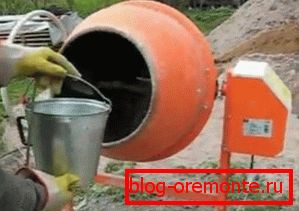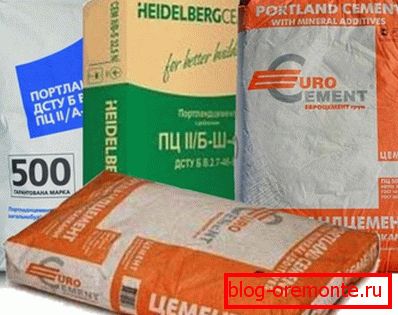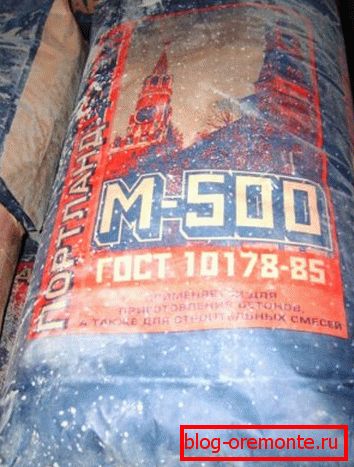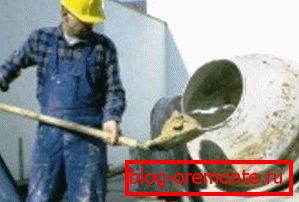How much cement per cube of concrete must be added -
Very often, developers are asked how much cement is needed per cube of concrete. To understand this issue in more detail, it is necessary to consider a number of important factors that affect both the process of preparing the solution and the quality of the final result. Many in their work with their own hands are guided by the principle of "the main thing to save," but this is fundamentally wrong, it is important to do everything in accordance with the technology.

Requirements for the components of the composition
To figure out how much cement goes to a cube of concrete, it is necessary to take into account the peculiarities of the correct selection of all components, only the use of high-quality components ensures that you get the solution of the right brand with characteristics that meet the requirements. You should not think that there is an instruction in which all exact data are indicated and it is written how much a kilogram of cement is in a cube of concrete.
All information that exists in the network comes from ideal conditions: quality components, compliance with the process and the optimum temperature and humidity of the surrounding air. But in reality, everything is wrong: bad weather conditions, not very high-quality components, and so on.

Water
It is safe to say that undeservedly little attention is paid to this component. But in fact, water along with cement directly affects the quality and strength of the composition.
It is important to know the following information:
- For work it is best to use pure warm water without impurities, rust and other contaminants. Water with silt suspensions acts especially badly on the quality of the mortar; therefore, it should not be collected from water bodies, since the concrete quality will deteriorate and cement consumption will increase significantly, since sludge and dirt reduce the binding properties.
- When working in the cold season, it is best to use warm water. This will not only simplify the mixing of the solution and the workflow, but will also accelerate the setting of concrete, which is a very important factor at low temperatures. Naturally, the temperature should be moderate.
- On the contrary, under high temperature conditions, when moisture evaporates very quickly and there is a danger of setting the compound too early, it is better to use cold water. It evaporates less intensively, which allows work to be carried out without fear that the solution will start to set right during work.
- Many people use a hose to add water, but in this case it is necessary to constantly control the consistency. If you need to measure certain proportions, the easiest way to use a bucket or any other container.

Also, the amount of water depends on the filler fraction:
| The required consistency | Grain fraction to 1 cm | Grain fraction to 2 cm | Grain fraction to 4 cm | Grain fraction to 8 cm |
| Liquid | 220-240 liters | 205-225 liters | 190-210 liters | 175-195 liters |
| Average | 210-230 liters | 195-215 liters | 180-200 liters | 165-185 liters |
| Moderately plastic | 200-220 liters | 185-205 liters | 170-190 liters | 155-175 liters |
| Nonplastic | 190-210 liters | 175-195 liters | 160-180 liters | 145-165 liters |
Sand
As practice shows, it is sand that is most often the reason that the actual mark does not correspond to the declared one. And how much cement goes to a cube of concrete depends mainly on the quality of the sand.
It is important to know the following factors:
- Fine-grained construction sand from ravines is not the best option for producing concrete. The fact is that the small fraction has less reinforcing properties, while the composition contains clay, which significantly degrades the quality of concrete and causes cement overruns.
- Medium and coarse-grained river sand with a fraction of up to 2.5 mm is excellent for making solutions of the highest grades. There are no impurities in the composition, which makes this option the most simple and high-quality solution.

- It is worth noting that career sand can also be used without restriction if it has been previously washed. But only industrial enterprises can do this; at home, this is a very labor-intensive process.
Tip! When using quarry sand, it must be sieved without fail through any improvised fixture, this will allow to get rid of plant residues and large inclusions of clay and black soil, if any.
Rubble
Another important component that affects the consumption of all major components.
Note the following:
- The fraction of rubble does not affect how much cement is needed per cube of concrete, but the strength of the mortar depends on it. Considered optimal sizes from 1 to 4 cm, but you can use larger versions with sizes up to 10 cm.

Recommendation! If you will be mixing the solution manually, it is better to choose a fraction of up to 3 cm, it is very difficult to mix larger versions in the solution, and they can be used only when using concrete mixing equipment.
- It is also important that the material is clean, free of debris and black soil, otherwise it must be washed before use.
Cement

No matter how important all of the above components may be, it is an indicator of how much cement is in a concrete cube that determines its brand and characteristics.
It is necessary to adhere to several recommendations:
- It is very important to monitor the accuracy of the cement proportion, since it is the main binder in the composition, the tolerance should be no more than a kilogram, and it is better to add more composition so that the properties of the concrete are not lower than required.
- Another fundamental factor is the cement brand.. The higher it is, the better the properties of the composition and the less it will be required when preparing the solution. The price is also different, but, ultimately, the use of more expensive options allows you to save on the total amount.
- Experts recommend that as the simplest dosage option, take all the components in proportions relative to each other.. So you can avoid serious mistakes, and weighing devices are not needed for work, few know how much a cube of cement weighs (1300 kg).
- For private developers, the easiest way is to calculate how many bags of cement in one cube of concrete, so in the process of work you will not need to constantly measure the composition, and always add a certain number of packages.

Consider how much cement in one cube of concrete should be:
- When using cement M400, concrete M150 will need 1 part of cement, 3.5 parts of sand and 5.7 parts of rubble, for M200 you will need a ratio of 1 to 2.8 to 4.8, and for M300 - 1 to 1.9 to 3.7.
- Using the M500 grade, one should adhere to the following proportions: for M150 concrete, 4.5 parts of sand and 6.6 parts of crushed stone should be added to 1 part of cement.
Accordingly, the ratio M200 this ratio will be 1 to 3.5 to 5.6, while the M300 - 1 to 2.4 to 4.3.

Conclusion
The correct calculation of the amount of cement is the main condition for high-quality and durable concrete. Any mistakes can spoil the result of the work, so we recommend to watch the video in this article, it shows some important points of the workflow clearly.